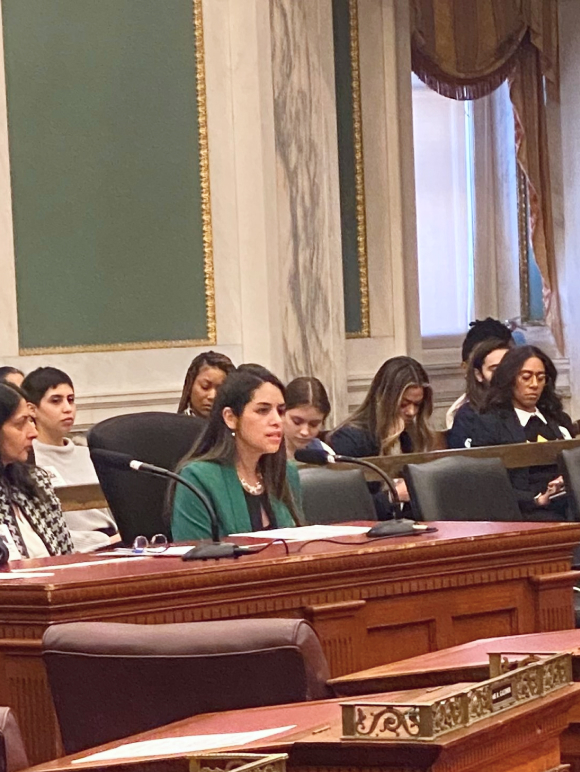Policy
We distilled evidence to inform
decision-makers’ efforts and joined
with partners to address pressing
child health issues.
Exploring Underinsurance to Understand Health Care Access and Affordability
Pediatric underinsurance, which is inadequate or inconsistent health coverage, has been on the rise over the past decade in the U.S. and has profound effects. PolicyLab is exploring this issue to understand the impact among specific populations and make recommendations to inform state and federal efforts to ensure children have access to coverage that meets their needs.
PolicyLab researchers recently looked at underinsurance among children with special health care needs, who often require frequent and intense care. They found that the likelihood of underinsurance among this population increased with the complexity of children’s health care needs, and identified a pronounced level of underinsurance among middle-income households. This work has led to collaboration with partners to inform efforts to better define and reduce underinsurance, including for specific populations.
The research team continues building evidence around this issue and is studying the landscape of underinsurance among immigrant populations. Preliminary findings show that underinsurance prevalence also varies by where a child is born. Future work aims to understand the impact of insurance type on the risk of underinsurance and devise solutions to optimize coverage for all children.

“Our research on underinsurance allowed us to explore trends that our previous work on children’s coverage only hinted at. While uninsurance rates are near historic lows for children in the U.S., this research suggests that coverage with a health insurance plan doesn’t necessarily mean that children and families’ needs are being met, particularly when children have special health care needs. This research can help inform policies to ensure that health insurance coverage is consistent and provides meaningful financial protections for all children.”

Doug Strane, MPH
Engaging With Policymakers
PolicyLab works closely with stakeholders in policy decision-making to provide research expertise and inform policy efforts on a range of issues impacting families. For example:
- Dr. Diana Montoya-Williams (right) shared testimony on proposed solutions to combat racial disparities in maternal mortality, along with written testimony from Dr. Meredith Matone, with Philadelphia City Council’s Committee on Public Health and Human Services.
- Dr. Aditi Vasan and Rebecka Rosenquist were panelists for “Advancing Medicaid/CHIP Continuous Enrollment for Children: Design, Developments, and Lessons Learned from State Coalition Building,” a webinar hosted by Manatt Health, Georgetown’s Center for Children and Families, and the American Academy of Pediatrics. They discussed research and policy related to health benefits of continuous enrollment for children.
- The Pennsylvania Rural Health Association invited Dr. Jennifer Whittaker to speak at a legislative briefing hosted by Pennsylvania State Reps. Dan Frankel and Kathy Rapp and State Sens. Michele Brooks and Art Haywood where she shared her research and expertise on maternal health in rural Pennsylvania.

Making Actionable Recommendations
Inequitable access to menstrual products can impact a young person’s physical and mental health, their attendance in school, and their ability to participate in the workforce. Collaborating with community partners, our experts continued to contribute research and expertise to achieve menstrual equity for all young people.
In partnership with No More Secrets, MBS Inc., we proposed actionable policy and systems recommendations to mitigate the impacts of period poverty on youth, as well as areas for future research in an issue brief. Collaborating with CHOP’s Office of Government Affairs, Health Policy, and Advocacy, we shared the issue brief and its findings with decision-makers in state and local offices and agencies in the region, as well as researchers and advocates working in aligned areas.
In addition, we funded a continuation of our partnership with No More Secrets to better understand the relationship between food insecurity and period poverty as a means for developing a menstrual product distribution program within a food pharmacy.
Achieving Equitable Access to Menstrual Health Care and Products for Adolescents and Young Adults
Read MoreQ&A: Engaging Communities to Alleviate Period Poverty with Lynette Medley
Read MorePeriod Poverty: The Public Health Crisis We Don’t Talk About
Read More
Informing Policymaking Processes
One mechanism for sharing PolicyLab research with decision-makers is submitting responses to requests for comment on proposed policies at the state and federal levels. For example, PolicyLab experts provided feedback on Pennsylvania’s Section 1115 Medicaid demonstration waiver application sharing support for multi-year continuous coverage for children under 6 years of age, made recommendations to improve participation in the Special Supplemental Nutrition Program for Women, Infants, and Children (WIC), and outlined for members of Congress the impact of paid leave on several infant and maternal health-related outcomes, to name a few.
This approach offers a direct avenue to inform the policymaking process with evidence and can result in our research-based recommendations being incorporated into final regulations.
Pennsylvania Department of Human Services Request for Public Comment: Section 1115 Medicaid Demonstration Waiver Application
CommentsRequest for Public Comment: Special Supplemental Nutrition Program for Women, Infants, and Children
CommentsBicameral Paid Leave Congressional Working Group: Request for Information on Expanding Access to Paid Leave
Comments“PennAEYC is fortunate to count PolicyLab among our partners, as we champion policy improvements and investment in Pennsylvania’s early care and education system. We consistently rely upon their insights as researchers and expertise in child health, bolstering our advocacy efforts to effectively educate policymakers on the unmet needs confronting children, families and the dedicated professionals serving them.”
